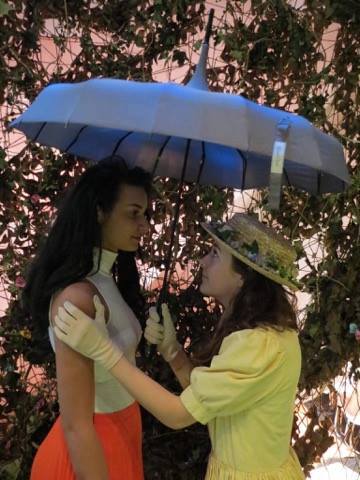“We are all actors. Everybody lies.”
As I fumbled my way through the various set pieces occupying Stage@Leeds last weekend, I was repeatedly reminded of this truism. For in The Waiting Room, a final year PCI production, you are part of the performance.
Breaking from the traditional performer-audience dichotomy, immersive theatre asks its audience to influence performances directly. This could mean simply playing with the set, or even undertaking the role of certain characters within the ‘play’. It’s certainly pretty wacky, a touch pretentious, and yet to take a serious foothold outside London.
The sort of thing my dear old Dad would probably call “art wank”.
Admittedly, it’s not for everyone. When the fourth wall is smashed with a sledgehammer, you’re often hyper-aware you’re being acted to. So, as we arrived in the foyer of Stage@Leeds (tonight, a 1950’s Speakeasy), forgetting that fact was my chief concern. Anxiously waiting, I re-read the letter we were handed on arrival. Dated September 1955, it cheerfully informed me I’d been accepted to teach English on the Greek island of Phraxos. Baffled still, we were then directed to whatever lay next door, leaving the jazz singer gently crooning behind us.
We found the back of the performance hall impressively converted into a darkened, almost eerie alleyway, on one side of which sat three, numbered wooden doors. Beyond them lay a network of eclectic set pieces; painstakingly produced origami, Greek markets ablaze with artificial sunlight. Each walled off from the next, these striking designs formed a claustrophobic grid of ‘scenes’, in which curious characters unveiled scraps of information. Jealous Alison bemoaned my move to Greece; a mysterious director showed me his photographs. Particularly effective was an all-white interrogation room, where a stern-faced woman demanded I stop smiling and speak to the camera. Unnerved, I quickly did as she said.
Though my experience was unsettling, this was largely thanks to the door I entered through. From his own space next-door, my friend was able to influence the way characters behaved towards me, to play God, using subtle cues like music and lighting. With the performance loosely based on The Magus, it was hard not to admire this touch. In that 1965 novel, a young Englishman in Greece becomes embroiled in the psychological mind games of a master trickster, eventually losing his grip on reality.
It is testament to the quality of The Waiting Room, its cast and concept that, as I sat outside waiting for my friends, I didn’t reflect on the fact I’d been acted to. Instead, I refused to fully accept the game was over, anticipating another bizarre conversation, unable to distinguish people from actors.
Perhaps that was the point.
Sam Corcoran
Image courtesy of Bobby Bates

